WAR AND PEACE (WITH EMBEDS)
As humans prepare for 22nd century living, the purpose of this page is to explore contemporary international relations. The purpose of this page is to explore the post-World War II (1939-1945) state of human existence. The purpose of this page is to explore the prospects for future global stability and peace. This page surveys some of the major international conflicts to have transpired on Earth in the aftermath of World War II. As the following link demonstrates, there has been no shortage of conflicts to arise on Earth since the end of World War II:
The intent here is not to overlook, oversimplify, or diminish any of these disputes. Each dispute is complex, sensitive, and unique for all participants involved. Sight should never be lost of the fact that these disputes, when taken together, have resulted in the injury and death of millions of humans. Humans continue to suffer as their leaders struggle to resolve disputes such as these. Regrettably, these kinds of international disputes are not always peacefully resolved by their leaders.
The videos below focus on the Israel-Palestine dispute; the North Korea-South Korea dispute; the India-Pakistan dispute; and the USA-Iran dispute. These conflicts were selected by me because they hold the potential for causing the deadliest and most destabilizing future human impacts. The one thing that each of these disputes has in common is this: Each of these selected countries either possess nuclear weapons, actively aspire to possess nuclear weapons, or have the technical wherewithal to possess nuclear weapons if they chose to do so. Anytime nuclear weapons are involved, then you are talking about the potential for an extinction-triggering event, that is, if these international conflicts should happen to spiral out of control and escalate into another global conflict.
The purpose of presenting the videos below is to provide a tiny bit of historical context to each of the disputes being depicted. The purpose of the videos is not to point fingers and assign blame to any particular party to the dispute. There is ample enough blame to go around for all parties involved on both sides of a given dispute or conflict. Personally speaking, I am neither pro- nor anti- any particular party to these various international disputes. I merely am pro-truth. I am pro-peace and pro-prosperity for all on Earth. I am pro-education for all on Earth. I am pro-water for all on Earth (that is, clean, drinking water). I am pro-food for all on Earth. I am pro-health for all on Earth. I am pro-prosperity for all on Earth. I am pro-sustainability for all living things on Earth.
THE NEW WORLD ORDER
In the aftermath of World War II, the era of colonial empires came to an end. Many newly independent nations emerged on the global scene; some brand new nations emerged, too. Although, to this day, many free associations remain between the newly independent nations and their former colonial rulers, the independent nations were left to chart their own courses and pursue their own destinies into the future.
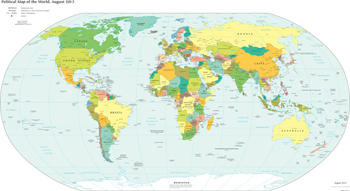
The process of gaining independence has not been without its share of growing pains. The process of national independence has been filled with its share of disputes and internal power struggles. The newly independent nations have had to make some major decisions. The newly independent nations have had to decide which social, political, economic, and religious structure to pursue. For instance, should they pattern their societies after the communist model of the East or the capitalist model of the West? Should they organize their societies around a democracy, dictatorship, or theocracy?
ISRAEL AND PALESTINE
| Country | Background | Profile | Google Earth |
|---|---|---|---|
| Israel | Background | Profile | Google Earth |
| West Bank and Gaza | Background | Profile | Google Earth |
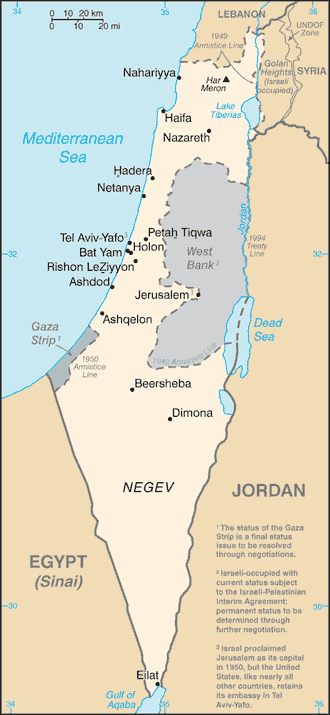
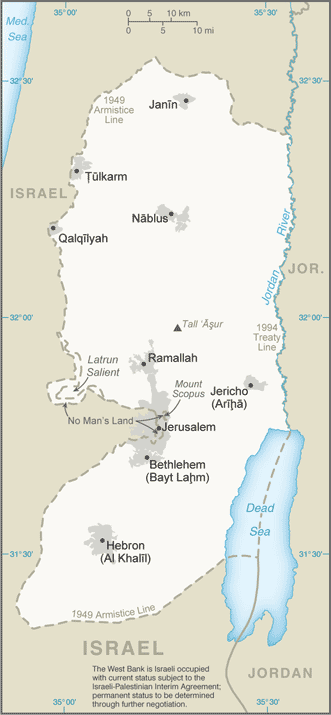
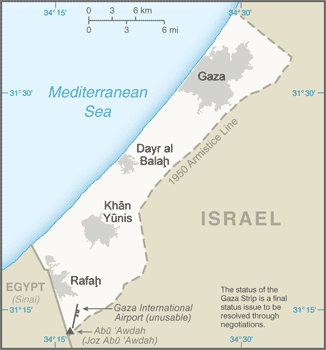
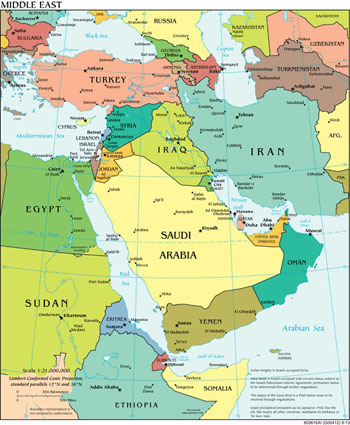
The Israel-Palestine dispute essentially is a dispute over first and last. The Jewish people were first to lay claims to the land of Palestine dating back to antiquity or the appearance of Adam and Eve on Earth. Over the millennia, the area known as Palestine came to be ruled by a series of empires. What has come to be referred to as the "Diaspora" during the age of the empires, the Jewish people were spread across the Near East, Middle East, and European regions. Prior to British colonial influence in the region leading into World War II, the Ottoman Empire was the last empire to rule Palestine. The Palestinian people were the majority inhabitants of the land of Palestine during the reign of the Ottoman empire. The Palestinian people were the last majority people to proclaim ownership of the land of Palestine leading into World War II.
The roots of the modern-day Middle East conflict, which reduces to a dispute over land but also contains some highly charged religious undertones, can be traced to the days when the United Kingdom administered Palestine after the end of World War I (1914-1918). During this period, through the Balfour Declaration of 1917, the United Kingdom made a commitment to form a Jewish state in Palestine. With the continued persecution of Jews in Europe and with Hitler's quest to annihilate the Jewish people during World War II, more and more people of Jewish descent sought refuge in Palestine. Given the prevalence of anti-Jewish sentiments in Europe, coupled with the subsequent Holocaust, after World War II ended, there was a general consensus among the world's great powers that the Jewish people should have their own homeland. The general sentiment across the globe was that the Jewish people had endured too much prejudice, suffering, and persecution in their various host countries.
Much like the USA's Declaration of Independence on July 4, 1776, Israel (formerly Palestine) declared itself to be an independent country on May 14, 1948. Not only did Israel's independence trigger a mass immigration of European Jews into Israel but also it triggered a mass emigration of Palestinians from Israel. Territorial fighting broke out between the Jewish people and the Palestinian people as early as 1947. Many Palestinians were displaced by the fighting in 1947 as they fled Palestine.
After Israel's declaration of independence, some Arab countries joined the Palestinians in the fight against Israel. The fight became known as the May 1948-June 1949 Arab-Israeli war. Israel prevailed in the war. More Palestinians were displaced by the fighting as they fled Israel. As more fighting and wars followed, Israel continued to prevail as the victor. As a result, the land mass of Israel expanded.
In essence, a homeland for the Jewish people has translated into displacement for the Palestinian people. The Jewish and Palestinians people have disputed ownership of the land since the official formation of modern Israel in 1948, that is, after World War II and colonial rule ended in the Middle East. In the USA, most Christians believe that the Jewish people are the direct descendants of God dating back to the appearance of Adam and Eve on Earth. Many USA residents feel a special kinship or bond to "God's chosen people" and can more readily identify with Israel. Generally speaking, buried deep into the psyche of Christians is that the Israelis, due to their Biblical origins, have a direct link to God. Many in the USA fervently support Israel due chiefly to their common Judeo-Christian religious tradition coupled with Israel's adoption of the USA-style democratic-capitalist model. Christians, in general, think that Israel must be supported and protected at all costs due to the perceived direct link of Israel to God as recounted in the Holy Bible.
The USA is Israel's staunchest supporter due chiefly to their common Judeo-Christian religious bonds. The USA also is Israel's biggest defender not only in the military arena but also in the court of public opinion. That is, when grievances are made against Israel in international forums such as the Security Council or the International Court of Justice, the United States is the first country to rush to Israel's defense. The USA provides Israel with billions of dollars of (mainly military) assistance each year.
One of the reasons why peace between the Israelis and the Palestinians is so elusive very well might turn out to be because Israel has grown to become the uncontested superpower of the Middle East. Israel has emerged as the superpower of the Middle East thanks chiefly to the unflinching and the unabated support of the USA. The USA has played a pivotal role in shifting the balance of Middle Eastern power to Israel's advantage. In a strict military sense, Israel has grown to become a miniature version of the USA in the Middle East complete with its own arsenal of nuclear bombs. Israel is somewhat secure in the knowledge that it can rely on unflinching and unabated USA support no matter what Israel does or how strong Israel becomes in the Middle East.
Effectively, no other country in the Middle East can counterbalance Israel's power, which has the explicit and continued support of USA military might. This scenario is exactly how some military hardliners in Israel want to keep it, that is, no Israeli military parity with other countries in the region but absolute Israeli military supremacy. How can it be that the USA, one of the world's preeminent powers today, would allow Israel to dominate the course of USA foreign policy in the Middle East? After all, the USA is a large, technologically advanced nation with a population close to 320 million people. Israel, too, is a technologically advanced nation, but Israel has a much smaller land mass relative to the USA's land mass and Israel has a much smaller population of about 10 million people.
That is to say, based on the USA's unblinking and unfaltering support of Israel, an untrained observer might be led to conclude Israel is the country that is providing the USA with billions of dollars in military assistance each year instead of it being the other way around. Why do so many USA politicians seem to adopt a one-sided view of the Israel-Palestine dispute, that is, a decidedly pro-Israel view? How can a small country like Israel wield so much influence over the decision-making choices of USA politicians when it comes to the Israel-Palestine dispute? While having allies is alright, when it comes to USA Middle East policy-making, some USA politicians put Israel and Israeli interests on so high of a pedestal until you might be tempted to conclude that their country was named the United States of Israel instead of the United States of America. What is really going on? In the case of the USA, I can tell you what appears to be going on. Several concurrent and reinforcing forces appear to be at work. These forces include:
- Strong and long-standing Judeo-Christian religious ties between the USA and Israel
- Long-standing and historical political relationships between USA politicians and pro-Israel politicians and lobbyists, namely, since the end of World War II
- Some of that good, old-fashioned, cold, hard cash from USA-based pro-Israel groups in the form of donations and contributions to the political campaigns of USA politicians
For, as the saying goes, money talks. Money buys political influence. Money buys political loyalty. Yet, the point here is this: All parties to the Arab-Israeli dispute require a fair and an impartial hearing, that is, if there is to be an enduring resolution of the dispute instead of an endless cycle of bickering, respite, and fighting.
The following link points to the "Foreign Aid" page of this website. The "Foreign Aid" page offers a more complete view of donor countries, recipient countries, and bilateral foreign aid.
An overriding theme of USA Middle Eastern policy has been the protection and preservation of Israel, which is a good thing. That Israel should be preserved as a homeland for people of Jewish descent should be viewed as something laudable. But, what about the protection and preservation of the Palestinians? What about a homeland for people of Palestinian descent? It was Ruth Bader Ginsburg who said, "All I ask of our brethren is that they take their feet off our necks," which certainly must be the sentiment shared by most Palestinians towards Israel.
Much is made of the right of the Jewish people to exist or live in peace and freedom in Israel, which I wholeheartedly support. But, what about the right of the Palestinian people to exist or live in peace and freedom in their own independent, sovereign nation, which I also wholeheartedly support? Must these two foreign policy goals of protecting and preserving both the Jewish people and the Palestinian people be mutually exclusive? Must one people be protected at the peril of the other one? Humans must learn to live together and share the Earth's resources and bounty.
Generally speaking, USA Middle East policy has tended to be more closely aligned to or in sync with Israel's definition of Israel's national security interests rather than the USA's definition of the USA's long-term strategic interests. Is it in the USA's long-term strategic interest to be at peace with the nations in the Middle East rather than at war? Is it in Israel's long-term strategic interest to be at peace with the Palestinians instead of perpetually humiliating them in battle? Must generation after generation of children be exposed to this adult lunacy? Must adults always keep a bunch of mess stirred up and brewing? Why can't adults simply enjoy their brief tenure on Earth without endlessly bickering with, fighting with, warring with, and killing one another?
In a civilized society and on a civilized planet Earth, when grievances arise, one of the primary forums of redress has been the court system. The grievance is taken before a fair and impartial court, a resolution is reached, and both parties to the dispute—be they countries, governments, corporations, organizations, private citizens, or some combinations thereof—agree to abide by the court's decision.
I must emphasize that Israel should not be bashed. The intent here is not to bash Israel but to speak the truth. Israel should not be viewed as the so-called bad guy in the Middle East conflict while all of the other parties are portrayed as the so-called good guys. The fact that many non-Israeli residents in the Middle East despise Israel or wish to see Israel dissolved is perhaps an understatement. Many in the Arab world staunchly support the Palestinians due chiefly to their common Islamic religious ties and their common Arabic cultural heritage. Moreover, neighboring Arab countries bordering Israel have had to absorb and accommodate some of the Palestinians refugees who fled Israel during the years of fighting. As a result, these neighboring Arab countries are naturally more sympathetic to the plight of the Palestinians.
A generally accepted axiom of warfare goes something like this: To the victor go the spoils of war. Israel has repeatedly emerged as the military victor in its confrontations with the Palestinians, in particular, and with some of Israel's neighboring Arab nations, in general. As a result, Israel has reaped the benefits of these military victories by expanding its land mass.
Another generally accepted axiom of warfare is this: When nations do choose to resort to warfare as a way to resolve conflicts, they must conduct warfare humanely, not savagely.
This particular axiom of warfare is something of an oxymoron or a contradiction of sorts. That is to say, by its very nature, war is an inhumane endeavor. By the same token, humane warfare reduces to a deliberate decision or agreement between warring parties to engage in mildly savage warfare as opposed to engaging in no-holds-barred, extreme, unbridled savagery.
According to the Jewish Virtual Library, as of 1918, the population of what is now modern Israel was 9% Jewish (or 60,000 inhabitants) and 91% Palestinian (or 600,000 inhabitants). As of 1946, the population of what is now modern Israel had become 30% Jewish (or 543,000 inhabitants) and 70% Palestinian (or 1,267,037 inhabitants). By 1948, the population of what is now modern Israel had become 82% Jewish (or 716,700 inhabitants) and 18% Palestinian (or 156,000 inhabitants).
By 1948, the sudden, dramatic, and almost overnight shift in the population composition of what is now modern Israel from majority Palestinian inhabitants to majority Jewish inhabitants, undoubtedly, is one of the root causes of the present-day schism and animosity between the Palestinian and Jewish people. The violent upheaval and the resultant dramatic population shift is one of the root causes of the present-day Palestinian-Israeli conflict.
In every dispute, there usually are two sides to the story. On the one hand, from the Palestinian viewpoint, they remain embittered about their present-day plight. Many Palestinians trace the genesis of their uprooted, sometimes occupied, sometimes oppressed, and sometimes refugee plight to the massive immigration of European Jews into Palestine after World War II ended. To this day, the Palestinians largely are viewed as a people in search of a solution to their nationless predicament, their uncertain future, and their sometimes concentration-camp-like existence.
On the other hand, from Israel's viewpoint, it wants the Palestinians, in particular, and their neighboring Arab nations, in general, to peacefully accept the fact that the nation of Israel is now a permanent fixture on the Middle East landscape. Israel wants the Palestinians and their neighboring Arab nations to peacefully come to terms with the fact that the clock will not be turned back to, say, 1918, when Palestine (now Israel) was 91% Palestinians and 9% Jewish. The Israelis are resolute in their determination that such a reversion of the land to a 1918-style arrangement simply will never happen, which would be akin to asking the USA to revert to a pre-1492 America when the Native American Indians comprised the majority population.
In contemporary terms, with the support and the military assistance of the USA, everybody realizes that Israel is the undisputed superpower of the Middle East. The Palestinians have been lambasted and condemned for resorting to terrorist tactics in their military confrontations with Israel. However, it does not take a genius to understand that the Palestinian military would be willing to engage in conventional battlefield warfare with Israel's military if their military capabilities via air, sea, and land were comparable to Israel's military capabilities. By resorting to terrorist tactics in their armed confrontations with Israel, the Palestinians simply are trying to make the most of the few military resources that they have at their disposal.
The Palestinians seem to have taken a page from the Vietnamese wartime playbook. It was the Vietnamese who demonstrated to the world that, one way to defeat a more capable military opponent such as the USA, was to resort to unconventional, underground, and guerilla-style military tactics. Even the Israelis occasionally resorted to terrorist tactics to dislodge the British from occupying Palestine (now Israel) during the late 1940's. It seems to have been acceptable for the Israelis to use terrorist tactics against their stronger British opponent during the 1940's but unacceptable for the Palestinians to use similar terrorist tactics against their stronger Israeli opponents in the 2010's. Both militarily and realistically speaking, most people recognize that the Palestinians are no more of a military match for Israel than was Iraq a military match for the USA during the USA-Iraq wars of 1990 and 2003. But, as the saying goes, everything [bad happening in the world] somehow can be rationalized, minimized, or justified until the exact same thing happens to you.
Please do not misinterpret me. I do not advocate or condone peoples or nations engaging in military combat or terrorism of any type as ways to resolve disputes. I simply am attempting to explain why is it that some weaker opponents (such as the Palestinians) tend to resort to seemingly desperate military measures when pitted against a much stronger opponent (such as the Israelis). I am—and I always will be—an unyielding proponent of peace and goodwill between humans.
To be sure, I think that the strong nation/weak nation scenario (that is, the superiority-inferiority dynamic or syndrome) was the impetus or decisive factor in prompting North Korea to build a nuclear bomb. In its ongoing dispute with the USA that dates back to the Korean War of 1950, North Korea felt that a nuclear bomb would give it a certain degree of leverage when dealing with the USA. This USA-North Korea nuclear conundrum is the same nuclear conundrum or dilemma faced by the entire world. That is to say, on the one hand, obviously, it would be a colossal mistake and an all but suicidal mistake for a small country such as North Korea to launch a nuclear weapon towards the USA.
On the other hand, all of this talk about nations firing nuclear weapons at one another is sheer lunacy, but nuclear weapons are the reality with which present-day humans must live. Never again should humans resort to the use of nuclear weapons to resolve disputes. War, in general, and terrorism, in particular, are not the answers to human survival and prosperity. If anything, war possibly could lead to human extinction.
You would think that, after all of these years, the USA and Russia; China and Japan; North Korea and South Korea; India and Pakistan; in general, and the Israelis and Palestinians, in particular, would let bygones be bygones, would come to their senses, and would start living in peace and harmony with one another. Yet, here it is 2014 and these countries—and other countries, too—are still bickering over the same geopolitical mess that generally dates back to the 1940's and the close of World War II. It seems as if the world's leaders remain trapped in a 1940's mentality. It is time for the world's leaders to break free from or to let go of the past and start preparing for 22nd century living.
Think about all of the good that could be done in the world if the trillions of dollars being spent by countries to prepare for warring with and killing one another, instead, were allocated to, say, providing schools, teachers, and education for all; providing clean water for all; providing sanitation for all; eradicating world poverty; finding a cure for cancer; building a perpetual human presence on the Moon, and so forth.
I previously mentioned how, due to fighting, upheaval, and displacement, the dramatic population shift in Israel during the 1940's from a predominantly Palestinian state to a predominantly Jewish state is one of the root causes of the present-day Israel-Palestine dispute. I think that another root cause or reason why it is difficult for the two parties to reach a permanent peace is the extreme imbalance of military power in Israel's favor. By having the military advantage in the Israel-Palestine dispute, there is less incentive on the part of the Israelis to sit down and negotiate a permanent peace with the Palestinians. You can rest assured that if the Palestinians possessed the same military capability to fly around Israel and drop bombs on Israel's residential buildings, places of worship, factories, and shops with virtual impunity, then the Israelis would be more than willing to negotiate a permanent peace. You can rest assured that if the Palestinians possessed the same military capability to cause thousands of Israelis to aimlessly wander the streets homeless, injured, and hungry, then the Israelis would feel a greater sense of urgency to seek a permanent resolution to their dispute with the Palestinians. Instead, because Israel's military power is unmatched and unchallenged, when it comes to resolving the Israel-Palestine dispute, Israel, generally speaking, appears to be more interested in engaging in stalling tactics. Israel, generally speaking, appears to be interested in indulging in the domination-subjugation-humiliation syndrome rather than seeking a permanent resolution to their dispute with the Palestinians. Naturally, the Palestinians are not blameless in the ongoing dispute. Palestinian atrocities, however, do not change the reality of power in the Israel-Palestine dispute.
The Israelis and the Palestinians appear to be hopelessly deadlocked. Both seem to want the other to unconditionally recognize and respect each's right to exist as independent, sovereign nations with no interference or meddling into each other's domestic affairs, but seemingly insurmountable strings are attached before each is willing to grant and honor such recognition. For instance, one string that the Palestinians find objectionable is Israel's demand that any Palestinian nation must be forbidden from arming or forming a military [namely, so that the random and indiscriminate attacks on Israeli civilians could stop], or Israel's desire to dictate some of the terms of any Palestinian sovereign-nation status as if the Palestinians were incapable of writing their own constitution and running their own country as they saw fit to run it. One string that the Israelis find objectionable is Palestinian demands for the removal of all impediments to free and unrestricted movement of people and commerce coupled with the return of lands lost by Palestinians to the Israelis over the years since World War II ended.
Instead of settling for perpetual fighting and killing, the international community has a role to play when deadlocked global conflicts arise. The international community, in conjunction with the disputing parties, should sit down at the negotiating table and devise a solution to the dispute. If the disputing parties cannot reach a resolution on their own, then the international community should reach a resolution for them. After a resolution is reached, it should be made binding. If necessary, the full military might of the international community should be brought to bear on the situation to ensure that the terms of the resolution are honored by both or all parties to the dispute. The goal of binding arbitration is for global civility and rule of law to prevail as the norm instead of perpetual fighting and killing.
Short of binding arbitration to resolve the dispute, one thing is certain, and it is this: the Israelis and the Palestinians cannot continue living forever in a state of conflict and war. At some point, sanity must prevail. Someone in the Israel-Palestine dispute has to step forward and say, "Enough of this ridiculousness. Enough of this madness. What on Earth are we doing to one another as humans? Why not peacefully put an end to the slaughtering now instead of later?" Hopefully, they'll come to their senses before the death toll reaches a million men, women, and children.
On 7-October-2023, fighters or terrorists from Hamas crossed the border from Gaza into Israel. It was a brazen and seemingly out-of-the-blue, unprovoked attack staged by Hamas as the Israelis were busy in their homeland trying to get on with daily living. These Hamas fighters proceeded to savagely murder some 1,200 Israelis and took hundreds more of Israelis to Gaza as hostages. This barbaric and outrageous 7-October-2023 action by the Hamas fighters represented the latest of numerous flashpoints or flare-ups in the ongoing Israel-Palestine conflict which dates back to 1948 over 75 years ago. In effect, in the Israeli military's brutal retaliation for the barbaric 7-October-2023 event, Israel seemed be to sending a message that says, "You started the latest barbaric confrontation, and we will finish it by depravedly reducing Gaza to rubble." Undoubtedly, Israel wanted to send a crystal clear message of deterrence to the Palestinians, to the surrounding Arab countries, and to the world that the nation of Israel is not to be messed with. At the same time, there is no other way to put it except to say that Israel's brutal retaliation in Gaza was obscene, offensive, foul, sadistic, over-the-top, horrific, gruesome, and overkill in terms of its overall human toll in innocent casualties, fatalities, misery, suffering, and destruction of property. It is true that perhaps Hamas got what it deserved for initiating the barbaric 7-October-2023 action, but at what price must innocent Palestinians pay for Hamas's barbaric action? The message is clear: Palestinian lives, generally speaking, do not matter.
Think about it: If Hamas had flown jets over Israel and bombed the nation of Israel in a reciprocal manner that equated to the same way in which the Israeli military went about indiscriminately bombing and roughshodding throughout Gaza (including desecrating gravesites and places of worship plus intentionally demolishing buildings and deliberately hindering the flow of much needed food, water, and medicine to innocent noncombatants), then the world would have been up in arms in condemnation. The world would not have stood for it. The USA would have militarily intervened directly into the conflict. Instead, in this instance of the Israeli military bombing Gaza into rubble, essentially, the world looked the other way. The world shook its collective head and shrugged its collective shoulders as if to say there is little that can be done about the situation except the student protests and the actions of the International Court of Justice.
Much is made in the USA news media about Israel's seven-front war with its adversaries also known as the Axis of Resistance—namely, 1. Hamas (the Gaza Strip); 2. Jundallah (the West Bank); 3. Hezbollah (Lebanon); 4. Imam Hossein Division (Syria); 5. Nujaba Movement, Kataib Hezbollah, and Ashab al-Kahf (Iraq); 6. Ansar Allah/Houthi (Yemen) and 7. Iran. The first 6 of these 7 Israeli adversaries are said to be sponsored by the nation of Iran. Little is made in the USA news media about the one common denominator between these 7 opponents of Israel. The one common denominator between each of Israel's 7 adversaries is this: Each one of them deeply sympathizes with the plight of the aggrieved Palestinian people. It is no secret that Israel's adversaries consistenly and historically have rallied around the Palestinian cause in solidarity with the Palestinian people over the intervening years. Similarly, much is made in the USA news media about the plight of the Israeli hostages—as much outcry should be made about their plight. At the same time, little is made in the USA news media about all of the innocent Palestinian casualties and fatalities suffered—and this reality should not be the case. It should not be the case where the lives of one group (in this case the Israelis) should be more highly valued over the lives of the other group (in this case the Palestinians). All lives should matter equally within the human family, and all humans are equally human.
It logically follows that if the Palestinian grievances are satisfactory and permanently redressed, then these 7 adversaries of Israel should cease to exist at least when it comes to their ongoing opposition to—and armed conflict with—the nation of Israel (hence, leading to Israeli security). The Middle East animosities between the Arabs and Jews would be solved if the Palestinian grievances are satisfactory and permanently redressed. It seems to be a very simple solution when it comes to Israel no longer being in a perpetual state of dispute with its Arab neighbors—except the unresolved matter of Isarel's dispute with Iran over Iran's acquisition of nuclear weapons.
It is apparent that Israel needs to divorce itself from the lives and daily affairs of the Palestinian people. Presently, Israel is deeply involved in the administration of the Palestinian territories, hence, the source of the conflict between the two parties notwithstanding historical disputes over land ownership. Obviously, when it comes to resolving conflicts, regardless of the time and place on Earth, diplomacy is preferred over war. As for Hamas, by prolonging the war triggered by its unprovoked slaughter and kidnapping of Israelis on 7-October-2023, its leaders simply do not know how to accept defeat on the battlefied. The dual issues of Palestinian independence and Israeli security must be achieved peacefully once and for all. There simply is too much bloodshed and killing in their relationship to and interactions with one another. The bloodshed and killing must end.
As a result of the 7-October-2023 slaughter by Hamas of over 1,200 Israelis and the retaliatory slaughter by Israel of over 65,000 Palestinians (not to mention the countless Palestinian injuries, loss of limbs, and an entire population of close to 2,000,000 Palestinians essentially having been rendered homeless, destitute, and reduced to nomads), so deep have the feelings of animosity, anger, hatred, and distrust grown between the Israelis and Palestinians until it might require nothing short of some type of partition of the land between the Israelis and Palestinians to effect peace between the two bickering parties. For instance, past partitions have included the partitions of India and Pakistan, North Vietnam and South Vietnam, North Korea and South Korea, and so on. Perhaps a Palestinian nation could exist in the northern section of present-day Israel (which would include the Palestinian inhabitants of both Gaza and the West Bank and also would include the re-location of Holy sites brick by brick), and a Jewish nation could exist in the remaining southern section of present-day Israel. After the partition, Israel and Palestine could exist as two distinctive and 100% autonomous countries much like Israel presently co-exists next to Egypt, Jordan, Syria and Lebanon. Perhaps the oil-rich Gulf nations could assist the Palestinians in achieving 100% autonomy as a nation by paying for the requisite infrastructure, buildings, and houses to be constructed anew. The bottom-line is this: All of this hatred, animosity, hostility, violence, and killing between the Israelis and Palestinians must end. Humans must learn to live and let live in peace, security, safety, and prosperity.
If the Protestants and Catholics of Northern Ireland could put down their weapons and move towards achieving a permanent peace, then so, too, can the Israelis and the Palestinians. If the West and East Germans could set aside their animosities and unite as one nation, then so, too, can the Israelis and the Palestinians grow to live in harmony. History is filled with examples of bitter national enemies setting aside their differences to become friends. To be sure, even as the Palestinian-Israeli conflict continues, the Arabs and the Jews living in the USA get along with one another just fine. Surely, if the Arab and Jews can get along in the USA absent any bickering and animosity, then they can find a way to get along in the Middle East. During the American Revolution at the close of the 18th century, never in their wildest imaginations at that point in time would the combatants have believed that the United States and the United Kingdom would end up becoming the closest of allies by the close of the 20th century. A perpetual state of hatred and violence between nations and between peoples is not the way for humans to live their brief tenure on Earth. Humans should enjoy the miracle of life on Earth and not destroy it.
It must be acknowledged that sometimes the decision to go to war reduces to choosing between the lesser of two evils. For instance, which is worse, going to war against Nazi Germany or standing by idly and allowing Adolf Hitler to exterminate the Jewish people (in the most horrific manner imaginable)? The overwhelming majority of humans would agree that standing by idly and allowing Adolf Hitler to exterminate the Jewish people is the worse evil. Therefore, going to war and killing people was justified if for no other reason than to put an end to Adolf Hitler's worse campaign to exterminate all Jewish people and conquer the world. Of course, there were other reasons for going to war against Adolf Hitler's Nazi Germany. Other reasons to put an end to Adolf Hitler's Nazi-inspired war machine included putting an end to Adolf Hitler's reign of terror across Europe and containing his megalomaniacal quest to conquer the world. What is the world supposed to do when a character like Adolf Hitler emerges on the global stage and engages in an orgy of killing? Adolf Hitler was responsible for the direct and indirect deaths of millions of humans across Europe, not to mention the millions more humans who were maimed and injured during World War II.
In the final analysis, it has to be concluded that, when it comes to the Middle East conflict between Israel and its neighbors, the USA has played an active role in tipping the military scale in Israel's favor. The second part of the Middle East conflict not discussed here involves various Islamic religious sects fighting among themselves. The "Tolerance and Respect" page of this website examines the phenomenon of religiously inspired Islam-on-Islam hatred, violence, war, and killing.
Let there be no illusions about the realities of wielding power and the limits of power. What were the main reasons why the USA willingly elected to wage an air war against ISIS but the USA cautiously decided to sit on the sideline when it came to the following international crises?:
- Not inspecting the wreckage of the downed Malaysian passenger airplane in Ukraine on 2014-Jul-17
- Not becoming more actively involved in the Ukrainian civil war for separatism by pro-Russian loyalists who oppose closer economic and cultural integration between Ukraine and Western Europe, or
- Not becoming more actively involved in opposing Russia's annexation of Crimea on 2014-March-18
The main reason for the USA's decision to sit on the sideline in the above disputes was due to Russia's active engagement in these direct spheres of Russian influence.
Russia, in effect, serves as a good counterbalance to USA military power—unless both the USA and Russia foolishly choose to engage in a nuclear war and kill everyone on Earth in the process over these small pieces of disputed Ukrainian land. Direct USA military action against ISIS versus tepid USA sanctions against Russia indicates that a balance of military power seems to be a deterrent against unbridled belligerence and aggression. A balance of power seems to encourage diplomacy between disputing parties over the choice of going to war.
A balance of power between nations seems to encourage compromise to resolve disputes. In my opinion, given the existence of nuclear bombs and given the capacity of nuclear bombs to induce human extinction, the USA's more reserved and cautious approach to Russia makes perfectly good sense. It is unthinkable for any national leader to go so far as to press the nuclear button to resolve a dispute with another country—and be responsible for killing every living thing on Earth in the process including himself or herself—that is, if that leader is in his or her right frame of mind.
How stupid of humans would it be for such an annihilation scenario were to come to pass? Only a mad person would initiate a nuclear war. In these days of nuclear weapons with their potential for inducing the extinction of life on Earth, geopolitical brinkmanship and egotistical chest-pounding are neither the place nor the time for world leaders to engage. Instead, world leaders need to take a deep breath, calm down, hold onto their horses, and chill out. World leaders need to pause and allow the anger to subside. Extinction avoidance requires world leaders to make prudent choices and wise decisions.
And, why is it that Russia is so willing to meddle into Ukrainian domestic affairs? In addition to historical and cultural ties between the citizens of those two countries, the decisive factor to explain Russia's meddling into Ukraine, once again, appears to be the imbalance of power between Russia and Ukraine. Sometimes wielding power can become intoxicating. It is the intoxicating nature of power that can lead to a global disaster. Not only did the rise of Adolf Hitler serve to illustrate how power can become intoxicating but also Adolf Hitler's fall illustrated how the intoxicating nature of power can become a perilous trap.
NORTH AND SOUTH KOREA
| Country | Background | Profile | Google Earth |
|---|---|---|---|
| Korea, Dem. Rep. | Background | Profile | Google Earth |
| Korea, Rep. | Background | Profile | Google Earth |
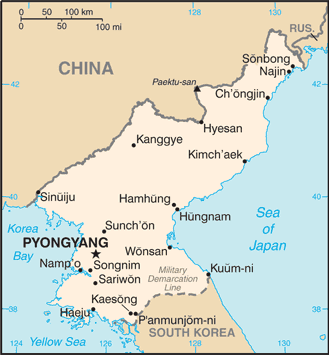
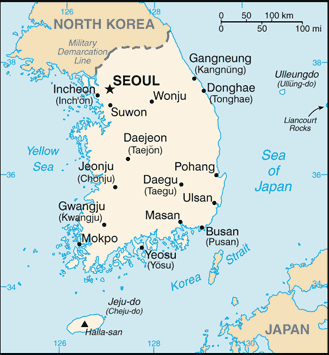
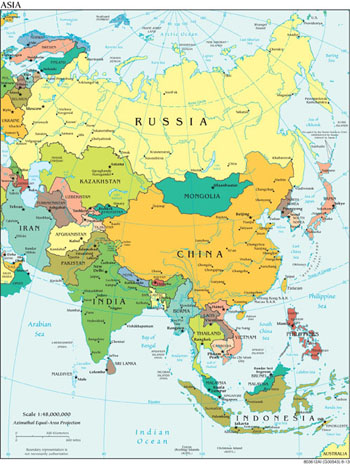
The Korean conflict can be viewed as an outgrowth of the geopolitical conflict between the (communist) East and the (capitalist) West. Amid the global upheaval caused by World War II, Russia and its allies lobbied countries where they wielded influence to adopt the communist model. The USA and its allies lobbied the same countries to adopt the capitalist model. Korea is one of those Asian countries that became a pawn in the East-West (mainly, Russia and the USA) quest for global geopolitical preeminence. However, in the case of Korea, it was more of a contest between capitalist USA and communist China instead of a contest between the USA and Russia.
As the following videos demonstrate, on the one hand, for the most part, North Korea remains solemn, serious, and bellicose in its relations with the USA and South Korea. North Korea very much remains in ready-to-go-to-war mode. On the other hand, for the most part, South Korea and the USA appear to be ready to put the past behind them so that they could move on to more earthly pursuits such as relaxing and enjoying life in a secure and free world.
From the USA's perspective, its main problem with North Korea is North Korea's development of long-range missiles, North Korea's development of nuclear weapons, and North Korea's constant war threats against the USA and South Korea.
From South Korea's perspective, its main problem with North Korea appears to be the constant threats of an outbreak of war. The South Koreans seem to want to witness a state of reunification and peace with North Korea, not a state of acrimony, disunity, and war.
From North Korea's perspective, the USA and its so-called South Korean collaborator are determined to elicit North Korea's downfall. An already reclusive and perhaps somewhat paranoid [about USA intentions] North Korea points to actions such as USA-led sanctions against North Korea and activities such as USA-South Korean joint military exercises as proof that the USA and South Korea are conspiring to, and are determined to, undermine North Korea's vitality as a nation and ultimately to elicit North Korea's downfall. Amid these perceived threats to its existence, North Korea appears to be withdrawing more deeply from the rest of the world. North Korea appears to be more willing than ever to wage war to survive both as a military-oriented communist nation and as a family-ruled dynasty.
It is extremely important for the people of North Korea to note the following about contemporary USA intentions. With the one notable exception of protecting USA access to oil, the USA does not take offensive military actions against another country. The USA is not a first-to-strike nation. The USA only attacks another country in response to an attack—or a perceived attack—upon the USA. One exception to the USA's defensive-only military posture is when another country commits atrocious acts, and the international community agrees to take collective military action against the offending country. In concert with a coalition of other countries, the USA might spearhead an offensive military strike against the offending country. Moreover, in response to the 11-September-2001 terrorist attacks inside the USA, the USA has proactively sought to uncover plots by terrorists to launch a similar attack inside the USA. If the USA happens to uncover a terrorist plot, then it will launch a preemptive military strike to prevent the planned terrorist attack from occurring. In short, the USA is not interested in launching any type of offensive military strike inside North Korea.
Admittedly, with the election of Donald Trump to the USA Presidency in 2016, the USA's posture towards North Korea has taken a dramatic shift seemingly for the worse. It is a shift for the worse (instead of a shift for the better) because millions of innocent humans in both North and South Korea possibly could be killed if there is an outbreak of war between the USA and North Korea, which instantly would involve South Korea and possibly even China. Suddenly, under the Trump presidency, the USA appears to be more willing to confront and engage North Korea in an adversarial manner rather than in a diplomatic manner. Once again, the USA is purported to be taking issue with North Korea's continued development of nuclear weapons especially in conjunction with a North Korean missle capacity to strike the USA with those nuclear weapons. The key difference between President Trump and his predecessors is this: President Trump is taking a more aggressive and confrontational posture towards North Korea. The USA leadership appears to be less and less willing either to visit the North Korean leadership in Pyongyang for face to face discussions or to invite the North Korean leadership to visit Washington, D.C. for face to face discussions to resolve their differences. When last I checked, China and Russia already have hundreds of nuclear weapons aimed at the USA. There does not appear to be a USA willingness to go to war with China and Russia over the nuclear weapons that they have aimed towards the USA. When last I checked, the USA does have hundreds of nuclear bombs that it could drop on North Korea at a moment's notice. Why, then, does the USA seem so willing to go to war with North Korea over North Korea's nuclear weapons? Could the answer to this question be a classic case of a stronger nation being more willing to impose its military might over a weaker nation? As I mentioned earlier, when you get right down to it, North Korea pursued the development of nuclear weapons in the first place in a bid to deter a much stronger USA from pursuing a policy of regime change in North Korea. This Korean drama dates back to Cold War geopolitical animosities and rivalries between the communist East and capitalist West at the close of World War II. The East-West/Communist-Capitalist rivalry is a relic of the post-World War II past. The East-West rivalry has endured down to the dawn of the 21st century. In the case of North and South Korea, the Soviet Union, China and the USA were the principal East-West players jockeying for power and influence in that region of Asia. Since the 1950's, the USA government and its military arm have aggravated and irritated the North Korean government in the name of containing the spread of communism. The outcome of this USA aggravation and irritation has been North Korean development of nuclear weapons. Fast forward from 1950 to 2017, should the USA still be over there on the Korean peninsula meddling into and intefering with North Korean/South Korean affairs? Should the USA abandon its Cold War posture and simply let North Korea, South Korea, and Japan work out their differences without any USA involvement? Have any lessons been learned from World War II? Have any lessons been learned from the atrocities of the Syrian civil war? Will humans ever quench their thirst for blood? Are these countries really ready to engage in World War 3?
Although the North Koreans might not necessarily view the world in this way, but let there be no mistake about it: "WE ARE ONE" species here on planet Earth. In other words, all humans are sisters and brothers from the perspective of their sharing a common genetical lineage dating back to the beginning of life on Earth.
Given President Trump's and Supreme Leader Kim Jong-un's peaceful overtures in 2018, it would be great if the discussion did not stop with the subject of North Korea's de-nuclearization. As expressed by President Trump's predecessors such as President Reagan and President Obama, why not move the discussion to the subject of world de-nuclearization?
If President Trump is truly a champion of peace and is a foe of war, then why does he not pursue peace with, say, Iran, Cuba, and the Palestinians with the same vigor as his peaceful outreaches to North Korea and Russia? There appears to be a nexus between President Trump's peaceful outreaches to North Korea and Russia and the fact that these two countries possess threatening nuclear weapons, which would suggest more of an ulterior geo-political motive for his outreaches rather than an anterior peaceful motive. President Trump appears to have little love or time for those long-established USA adversaries that do not possess nuclear weapons.
INDIA AND PAKISTAN
| Country | Background | Profile | Google Earth |
|---|---|---|---|
| India | Background | Profile | Google Earth |
| Pakistan | Background | Profile | Google Earth |
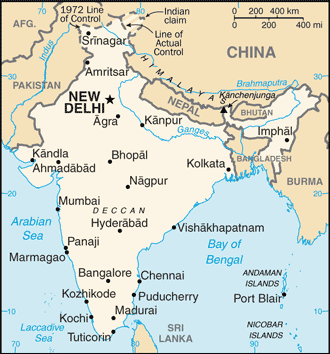
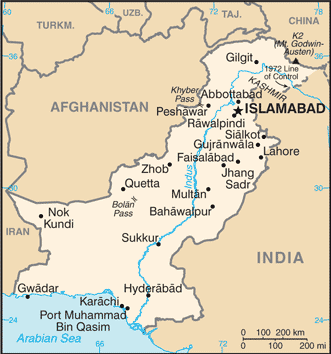

Because the India-Pakistan dispute does not directly impact USA national interests, coverage of this unresolved dispute receives limited coverage by the USA news media (which could be a good thing in the sense that sometimes sensational media coverage of an issue only serves to inflame the situation rather than serving to inform and enlighten). As a result, while USA citizens constantly are being reminded about the Israel-Palestine dispute, many USA citizens know little to nothing about the India-Pakistan dispute.
Yet, the stakes for humanity are tremendous given that both India and Pakistan are sitting atop stockpiles of nuclear bombs. When the British relinquished its control over India at the end of World War II, a split emerged between the Hindu, Sikh, and Islam religious followers. The followers of Islam mainly migrated to the newly created Pakistan region; and the Hindus and Sikhs migrated to the India region. Among other disputed territories, both India and Pakistan claimed ownership of the Kashmir region (and China, too, to a lesser extent).
It is astonishing the degree to which many disputes on Earth involve religion. It is astonishing how much violence and killing occur on Earth in the name of religion. Not too much unlike the unresolved Israel-Palestine dispute over land, while the contemporary India-Pakistan dispute also mainly revolves around land, the main spark was their religious differences (mainly the Hindu faith versus the Islamic faith). The irony of Earth's religious disputes is this: Most religious dogma teaches peace, love, and a brotherhood of humankind. The resultant religious-inspired bickering, violence, and killing represent the antithesis or complete opposite of peace, love, and a brotherhood of humankind.
These two countries run a very serious risk of wiping one another from the face of Earth if they were to engage in a nuclear war. The sad, sad irony of religious conflicts is this: Should a future nuclear war ensue between India and Pakistan based on their religious differences—and I hope that it never does ensue—then it would reduce to an instance of humans annihilating one another over something (God) that might not even exist (except in their imaginations).
USA AND IRAN
| Country | Background | Profile | Google Earth |
|---|---|---|---|
| United States | Background | Profile | Google Earth |
| Iran, Islamic Rep. | Background | Profile | Google Earth |
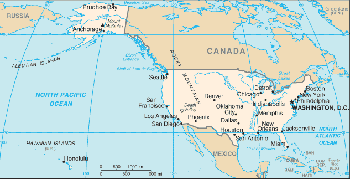
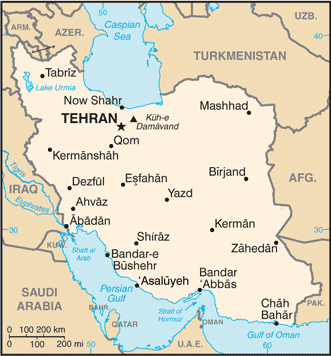
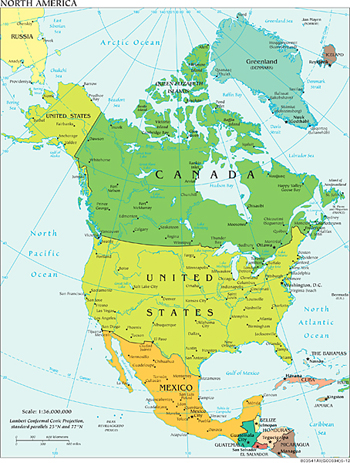
Cuba and North Korea were branded as a part of the "axis of evil" by the USA government mainly due to this: These two nations opted to align their societies with the Eastern communist model. Iran's overthrow of a pro-Western, secular regime (that is, Shah Mohammad Reza Pahlavi) in favor of a pro-Islamic, theocratic regime (that is, Supreme Leader or Grand Ayatollah Ruhollah Khomeini) was the main reason why it was branded by the USA as a part of the "axis of evil". The USA-Iran dispute was worsened by Iran's holding of USA citizens as hostages. From the USA's perspective, the USA-Iran dispute was worsened further by Iran aligning itself with nations which held anti-USA sentiments. From Iran's perspective, the USA-Iran dispute was worsened by the perceived one-sided USA support of Israel to the detriment of the Palestinians.
Although I do believe that the main motive behind Iran's quest to develop nuclear energy is to counterbalance or rival Israeli military power in the Middle East by eventually developing a nuclear bomb, I also believe that the USA is using Iran's quest to develop nuclear energy as a reason not to improve relations with Iran. For instance, the USA does not appear to have a problem with its allies developing nuclear energy or a nuclear bomb. The USA only seems to have a problem with its adversaries developing a nuclear bomb. For instance, as a counterbalance to North Korea, I very seriously doubt if there would be much opposition in the USA if South Korea or Japan decided to develop a nuclear bomb (that is, if those two nations, one day, should decide to join the nuclear-bomb club).
Whereas Pakistan is the first (Sunni) Islamic nation to develop a nuclear bomb, I do believe that Iran wants to earn the distinction of being the first Shia Islamic nation to develop a nuclear bomb. The USA-Iran dispute is further strained by the USA's alliance with Israel. Due to Israel's hostilities with Iran (and vice versa) as of 2013, Israel perceives that Iran's development of nuclear energy would lead to Iran's development of a nuclear bomb. If Iran should succeed in developing a nuclear bomb, many in Israel would view Iran's possession of a nuclear bomb as a very real threat to the existence of Israel and the Jewish people. In some future dispute, many Israelis believe that it could lead to the annihilation of Israel if Iran developed and succeeded in dropping a nuclear bomb over Israel. Iran's denial of the Holocaust by some of its leaders and Iranian political rhetoric about wiping Israel off the face of Earth only serve to heighten tensions between the USA, Israel, and Iran. Having endured and survived the Holocaust, obviously, the Jewish people of Israel take all such annihilation rhetoric very, very seriously.
From Iran's perspective, very little is said or done on the international stage when the USA openly supplies Israel (and its friends such as Egypt and Turkey) with billions of dollar in assistance and military aid. If Iran were to openly supply its friends and allies with military aid, then there would be worldwide outrage, condemnation, and repercussions directed towards Iran. If Iran truly wishes to develop a nuclear bomb without impediments, then political realities seem to suggest that becoming genuine friends with the USA and Israel probably would be the best way for Iran to go about doing it (not that I personally recommend for any nation to take the nuclear weapons route).
In the present-day USA-Iran-Israel dispute as of 2015, it is very important for the reader to note that, generally speaking, Iran is depicted as the so-called "bad guy". The USA and Israel, generally speaking, are depicted as the so-called "good guys" in their dispute with Iran. While the USA and Israel stridently oppose Iran's acquisition of a nuclear bomb, both the USA and Israel already possess their own stockpiles of nuclear bombs. Conventional wisdom or the general presupposition is this: If Iran were to one day acquire a nuclear bomb, then it would drop the nuclear bomb on another country during warfare. During World War II, the USA was considered to be the so-called "good guy," yet, the USA was the first and only country to drop nuclear bombs on another country (Japan). Given this reality, how can anyone be certain that so-called "bad guy" Iran would be the first to drop the nuclear bomb in warfare against another one of its Middle East neighbors? Who is to say that Iran would be any more imprudent with their nuclear bombs than, say, the USA or Israel is prudent with their nuclear stockpiles?
After all, so-called "good guy" USA has already dropped nuclear bombs on another country. "Good guy" USA was the first country to develop a nuclear bomb, and, as the saying goes, the rest is nuclear weaponry history. (Of course, it was believed that Adolf Hitler also was trying to develop a nuclear bomb. It truly would have been a global disaster if Adolf Hitler's Nazi Germany had been the first country to possess nuclear bombs. And the world will never know whether or not Japanese leaders would have dropped nuclear bombs on the USA had Japan become the first country to possess them.)
How is it perfectly okay for the USA and Israel to sit atop their stockpiles of nuclear bombs but point the finger at Iran and declare that Iran is too irresponsible to possess nuclear bombs and therefore is forbidden from doing so? In the final analysis, the USA-Iran dispute reduces to a contest about control, dominance, and maintaining an imbalance of power. Is it a fallacy or smokescreen to assume that the Western powers are extremely responsible with their nuclear bombs whereas the Eastern powers are not? Again, history reveals that USA President John F. Kennedy seemed more willing to accept an outbreak of nuclear war than was Soviet President Nikita Khrushchev during the Cuban missile crisis of 1962. Of course, President John F. Kennedy's willingness to go to war with the Soviet Union probably was because Soviet nuclear bombs would have been placed so close to USA territory in Cuba, hence, giving new meaning to the phrase "first strike capabilities".
It is critical for the reader to note that, despite all of the USA government rhetoric about the Iranian government being an evil empire and a state sponsor of terrorism, the Iranian people are no different from you and me. They are a people aspiring to make a decent living, provide for their families, and enjoy life on Earth. Both the USA and Iran are guilty of supplying arms to those whom they deem as a friend or ally. And, speaking of terrorism, the argument also can be made that dropping bombs from airplanes on population centers is perhaps one of the worst forms of conventional terrorism (and intimidation) on Earth. Dropping bombs from airplanes, of course, is a mainstay of USA warfare. Do you remember the "Shock and Awe" bombing campaign in Iraq? Do you think the Iraqi people who experienced it were terrified by "Shock and Awe"? I think that they were terrified and traumatized by those bombs dropping around them. It is interesting how those who were dropping the bombs viewed it as "shock and awe". Those who were the recipients of those bombs viewed it as "terror and trauma". But, as the saying goes, everything [bad happening in the world] can be justified until the exact same thing happens to you.
To be sure, many in the Arab world do not view the USA as an honest and independent broker of peace in the Middle East crisis. Rather than viewing the USA as being a neutral and impartial arbiter of peace between the disputing Middle East parties, many in the Arab world view the USA as harboring a double standard or prejudice in favor of its friend and ally, Israel. Some view the USA as being a part of the problem rather than being a part of the solution to the Middle East crisis. Some think that the USA should recuse itself from the Middle East peace process and allow one and/or some (combination) of the European powers and/or Asian powers to spearhead the effort as brokers and keepers of the peace in the Middle East.
To expond on the double standard, take the barbaric slaughter and kidnapping of Israelis by members of Hamas on 7-October-2023. President Donald Trump did not hesitate to issue an ultimatum to Hamas demanding that Hamas must release all of the kidnapped Israelis or all Hell would break loose in Gaza and there would be devastation for Hamas like the world has never witnessed. President Donald Trump would not dare issue an ultimatum to Israel demanding for Israel to stop the bombing of Gaza and broker a peace deal or all Hell would break loose in Israel and there would be devastation for Israel like the world has never witnessed. Such is the way of world politics whereby the interests of the weaker nations/people are cast aside in deference to the interests of the stronger nations/people.
As food for thought, what will happen if Germany, on some future date, should decide that it needs to keep a stockpile of nuclear bombs? Will the Israelis oppose such a development by Germany? Would Israel decide preemptively to bomb Germany's nuclear bomb-making facilities to prevent Germany's development of a nuclear bomb? In the event of such a reality, what would happen if Germany should decide to retaliate for the bombing of its facilities by Israel? Will the USA come to Israel's assistance if Germany retaliated against Israel for the bombing? Will both Israel and the USA be more inclined to take a conciliatory approach towards Germany compared to their hard-line stance towards Iran? Should the USA allow itself to be drawn into a war that could turn nuclear over something as petty as squabbles between two small countries over several hundred square kilometers of land? Is all life on Earth worth getting killed over several hundred square kilometers of land, which could be the outcome if a given conflict escalated into an outbreak of nuclear war, especially if these squabbles are being driven by the selfish ambitions of power-hungry leaders who preside over these smaller countries?
It is worth noting that some Arab countries are not exactly models or pillars of sainthood. There is more than enough blame to be assigned to all parties in the Middle East dispute. There is lingering vitriol on both sides of the Middle East dispute. For instance, far too many followers of Islam are so blinded by strict adherence to religious dogma, fanaticism, and extremism until they do not seem to see the big picture. It seems that the modus operandi or raison d'etat for far too many of these Islamic zealots reduces to little more than a lifetime devoted to jihad, hatred, violence, and killing in the name of Allah. Do you honestly think that Allah approves, condones, or advocates all of this hatred, violence, and killing occurring across Earth in His name? I do not think so. Think about it for a moment. Allah is commonly believed to be an All-Powerful Entity. By virtue of being an All-Powerful entity, it logically follows that Allah does not need humans to do His bidding. Allah does not need humans to be running around Earth and engaging in all kinds of havoc, mayhem, violence, and murder in His name. If Allah wishes to do harm to certain humans for whatever reason, being an All-Powerful Entity, then it logically follows that Allah is fully capable of taking matters into His hands. Allah is fully capable of dispensing whatever kinds of punishments to whomever He sees fit to punish without any assistance from humans.
What's really going on is this: You have humans who are using Allah as cover or who are using Allah as an excuse to legitimize, justify, and perpetuate their own desires to engage in acts of hatred, violence, and killing. These acts of hatred, violence, and killing do not have anything to do with Allah. These acts of hatred, violence, and killing have everything to do with the inability of some humans to quench their insatiable thirst to spill some human blood. There are some people on Earth who seem to have nothing better to do with their time except to eat, drink, breathe, sleep, and dream a constant diet of hatred, violence, and killing. The murderous behavior of these religious zealots is more akin to Satan than Allah. As noted on the "Final Frontier" page of this website, the time is overdue for the practitioners of hatred, violence, and killing to open their eyes and realize that the dawn of a new age has arrived on Earth.
Anytime or anywhere on Earth a human murders another human being in the name of religion—or politics or race—clearly, he or she is taking his or her religious beliefs far, far, far too seriously—and too literally. Anytime or anywhere on Earth a human murders, is willing to murder another human being, or is willing to falsely assassinate the character of another human being in the name of religion—or politics or race—well, that is when he or she crosses the line into the immoral. Anytime or anywhere on Earth a human murders, is willing to murder another human being, or is willing to falsely assassinate the character of another human being in the name of religion—or politics or race— that person no longer can be categorized as being passionate about a topic but becomes categorized as being either severely mentally disturbed or completely deranged. Regardless of one's religious faith, I very seriously doubt if any loving and compassionate God or deity would advocate or condone murder or character assassination simply for religion's sake.
For those humans who are found guilty of engaging in the crime of committing savage and barbaric acts against humanity anywhere on Earth in a just court of law, the punishment should be a one-way ticket aboard an airplane on a trip of banishment to spend the remainder of their lives on some barren, desolate, remote, and inhospitable island on Earth. Civility among humans must reign supreme on Earth, not savagery, that is, if the human species wishes to survive and prosper.
Humans must learn to accept religious—and racial—tolerance on a diverse planet Earth. Some of these Islamic zealots seem unified and resolute in one thing and one thing only—hatred of Israel and the USA. A lack of education, a lack of knowledge, or ignorance seems to play a major role in the perpetuation of hatred on Earth. As I stated on the "A Little Knowledge" and on "The Nuclear Threat" pages of this website, the big picture is this: As far as humans know, Earth is the crown jewel of the Universe. Earth lies anchored or tethered to its mothership, the Sun. Earth's uniqueness in the Solar System is its bountifulness or its overabundance of life. Despite their racial, religious, cultural, ideological, and international differences, all humans are one species here on Earth. Humans are stuck together here on planet Earth essentially in the middle of nowhere except being tucked away in some nondescript corner of the Milky Way galaxy while the Milky Way galaxy floats outward into the vast reaches of space and time. One another is about the only thing that humans have on planet Earth with certainty—and humans also have, as companions, the other life forms with whom humans share the Earth. United in peace, the human species will thrive and perhaps achieve greatness in life (like attaining Heaven on Earth). Divided in hatred, the human species will fall and perhaps become extinct (which would be likened to attaining Hell on Earth). These diametrically opposing futures or destinies for humankind go to the very essence or heart of the book The Age of Homo Sapiens Sapiens: Heaven or Hell.
Stevie Wonder seems to have the right idea. Instead of raining down bombs of havoc, destruction, and death on Earth, Stevie Wonder's recommendation is for humans to find a way to "Rain Down Your Love" on Earth. Instead of opting for war as the way to resolve international conflicts, Stevie Wonder's recommendation is for humans to engage in "Conversation Peace" as a way of life. In summary, Stevie Wonder is resolute in his belief that "Positivity" and "A Time To Love" are two of the best ways for humans to proceed into the future. When you get right down to it, the USA-Iran dispute reduces to a 20th century history of USA meddling into Iran's domestic affairs. The USA-Iran dispute reduces to a 20th century history of the USA trying to shape Iran's government into a pro-Western government. It turns out that Iran is not blameless either. It appears that Iran has turned out to be to quite the meddler itself. At the dawn of the 21st century, Iran has gained a record for meddling into the domestic affairs of Iraq, Syria, and Lebanon.
THE THIRD WORLD
| Country | Background | Profile | Google Earth |
|---|---|---|---|
| Uganda | Background | Profile | Google Earth |
| Zambia | Background | Profile | Google Earth |
| Congo, Dem. Rep. | Background | Profile | Google Earth |
| Sudan | Background | Profile | Google Earth |
| South Sudan | Background | Profile | Google Earth |
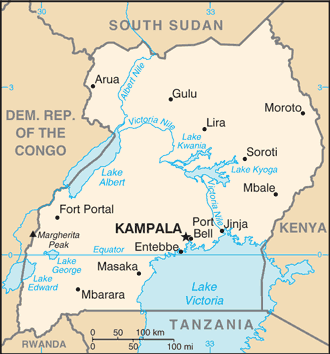
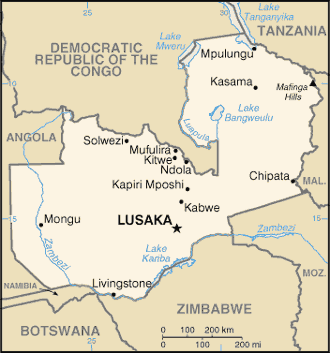

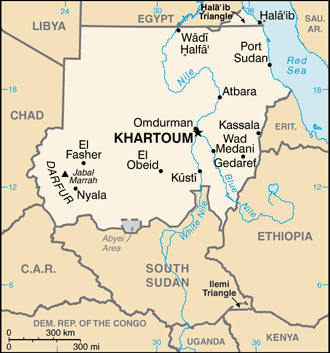
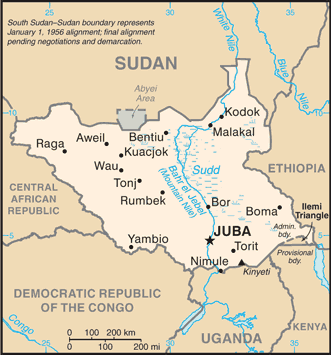
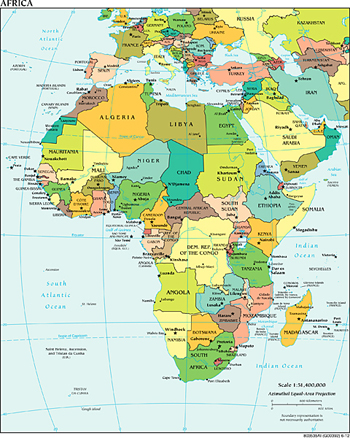
In the aftermath of World War II, many countries on the African continent also gained independence from their colonial rulers. These newly independent nations, too, sought to find their place in the new world order. While these African countries do not pose the threat of exploding a nuclear bomb on Earth, the threat in Africa seems to lie with the potential for an explosion of a population bomb. The threat in Africa appears to lie with population growing faster than the ability of the respective host countries to provide adequate food, clothing, shelter, and water for their growing citizenry. All other things being equal, a population explosion in Africa would be akin to the world having to cope with a perpetual humanitarian crisis.
Generally speaking, on the one hand, the story of contemporary Sub-Saharan Africa (or black Africa) reduces to a story of a people besieged by abiding poverty, low education, tribalism, and a prevalence of superstitious beliefs. The problem with low education and superstitions is this: These traits generally are synonymous with being gullible. These traits make the uninformed vulnerable to being deceived and cheated by charlatans and manipulators who harbor little sense of fairness.
On the other hand, Africa is a continent that is both rich with natural resources and abundant with unspoiled natural beauty. These dualities, on the one hand, make Africa a continent ripe for exploitation by more sophisticated nations. On the other hand, in terms of futuristic living, Africa, being mostly an undeveloped continent, is an ideal candidate to jettison or leapfrog into the 22nd century through implementation of futuristic technologies as it develops (say, for instance, the ability to pursue a 100% clean-energy mode of living and development). The following videos provide clues and insights into the Sub-Saharan Africa development dilemma.
>
One thing is certain, and it is this: The case of South Sudan provides a textbook example of how not to proceed into the future. When South Sudan became an independent country in the year 2011, an aura of optimism filled the air. With its oil reserves and its oil revenue, it was believed that peace and prosperity would become the norm in South Sudan. However, when the forces of corruption, tribalism, greed, and power-mongering took over, South Sudan degenerated into civil war and became a basket case, so to speak. Perhaps the warring factions in South Sudan can learn a thing or two from the leaders of the United Arab Emirates. The leaders of the United Arab Emirates have wisely chosen to use their oil resources not only to erect one of the most ultra-modern countries on the planet (for example, the city of Dubai) but also to build roads, bridges, schools, hospitals, offices, shops, factories, housing, and so forth, for the advancement of their citizens. If the leaders of the United Arab Emirates have had the presence of mind to utilize their oil resources to invest wisely for the future benefit of the country, then surely can the leaders of South Sudan do the same thing for their citizens if but on a less grandiose scale.
The leaders of Botswana seem to get it, that is, they seem to see the wisdom in choosing peace and prosperity as the most prudent way forward into the future instead of choosing war and destruction.
It is mind boggling and distressing to think that, as of 2024, the 2023 civil war in Sudan has rendered upward to 12,000,000 people homeless, destitute, and on the brink of starvation not to mention the countless innocent lives lost by the fighting between the warring factions. The situation is all bad. How much worse can it get? When will Africa—and indeed the world—turn the page on this type of senseless mayhem and killing?
THE NUCLEAR AGE
After World War II ended, the Cold War and the nuclear arms race began. The post-World War II state of human existence on Earth is punctuated by the decline of empires and the emergence of great powers. The five permanent members of the United Nations's Security Council—the United States, Russia, China, France, and the United Kingdom—generally are deemed as the greatest of all national powers relative to other nations on Earth. It appears that one surefire way for a lesser power to get the great powers to take notice is for a lesser power to develop a nuclear bomb.
It is a gigantic sigh of relief to know that, as of 2013, the USA and Russia and also the USA and China seem to have outgrown their Cold War enmities. They seem to have moved beyond their Cold War posture of belligerence. Their long-standing animosities appear to be dissipating. Mutual respect and peaceful co-existence appear to be general rules of engagement between these superpowers. Excluding France, more nuclear bombs are possessed by the USA, Russia, and China than any other nuclear nations on Earth. The USA, Russia, and China are more than capable of destroying all life on Earth in an all-out exchange of nuclear bombs.
Despite the Cold War having ended, all it takes is for one international conflagration to cause the East and West to revert to their old Cold War postures of brinkmanship. There still remains enough of a gulf or divide between the USA, Russia, and China to allow seemingly petty international misunderstandings to spiral out of control. Distrust (due to various national and historical differences), greed, and a lack of mutual respect among humans on Earth go to the heart of their problems in human relations and their problems in international relations.
In this climate of international distrust and suspicions (hence, one of the main motives for international espionage), it is very easy to understand why weapons of mass destruction are so appealing. It is easy to see why nations might want to acquire them. Besides gaining the prestige of being classified as a superpower, some nations aspire to obtain an arsenal of weapons of mass destruction for the same reasons why many humans want to own firearms. Weapons are viewed as the ultimate equalizers. They are viewed as game changers that can level the playing field. Weaker members in society view firearm ownership as a check against the transgressions of the strong, or as a check against the criminal-minded members of society. Similarly, smaller nations consider a nuclear arsenal as an effective check against the transgressions of stronger, larger, and more powerful nations.
Leaders of non-nuclear nations make a good point when they argue that the nuclear nations are being ridiculous and hypocritical. Some non-nuclear nations argue that it is easy for countries like the USA and Russia to call for nuclear non-proliferation while they sit atop their own stockpiles of nuclear bombs. With thousands of nuclear weapons to back up their threats, the nuclear nations clearly have an advantage when negotiating war-and-peace or bread-and-butter issues with non-nuclear nations. The hypocrisy is this: The nuclear powers seem to be saying to the non-nuclear powers, "We have every right to stockpile nuclear weapons to defend our societies against annihilation, but you have zero right to stockpile nuclear weapons to counterbalance or defend your nation against our ability to annihilate you." Some non-nuclear nations deem the argument against nuclear proliferation as unacceptable and untenable given the reality of nuclear nations sitting atop their own stockpiles of nuclear bombs.
The non-nuclear nations probably would be willing to take the nuclear nations more seriously about non-proliferation if the nuclear nations disposed of their nuclear, chemical, and biological weapons. Some argue that, in conjunction with the nuclear nations calling for nuclear non-proliferation, the equitable course of action would be for all of the nuclear nations to destroy their nuclear, biological, and chemical stockpiles, too. Could it be that nuclear weapons only give the false illusion of invincibility?
When it comes to nuclear proliferation, it is worth noting that two wrongs do not make a right. In terms of human survival, just as it was a bad thing when the nuclear nations decided to develop and stockpile nuclear bombs, it equally is a bad thing for non-nuclear nations to emulate the nuclear nations. There needs to be a two-prong approach to resolve this weapons-of-mass-destruction proliferation problem. The first prong is for the non-nuclear nations to abandon their nuclear weapons ambitions. The second prong is for the nuclear nations to destroy their stockpiles of nuclear, biological and chemical weapons. A future of Heaven or Hell on Earth for the living is at stake.
The world becomes infinitely more dangerous as additional nations acquire nuclear bombs. The chance of another nuclear exchange on Earth increases each time an additional nation acquires a nuclear bomb. The nations of the world have to find the will to halt any additional development of nuclear weapons. At the same time, the nuclear nations must come together and devise a comprehensive and verifiable program to destroy all of their existing stockpiles of nuclear bombs. Much like ominous dark clouds in the sky, the world's nuclear bombs perpetually are hanging over the heads of humans just waiting to rain down nothing but havoc, destruction, and death on Earth.
A common sentiment seems to be that Western countries can be trusted to behave rationally and responsibly with their nuclear bombs but non-Western countries cannot be trusted to reciprocate (despite the USA being the only country to actually drop two nuclear bombs on two Japanese population centers during World War II). When it comes to the fight, that is, when it comes to war, if a nuclear country feels cornered with its back pinned against the wall, then there is no telling what type of military response would result. There is no telling how the cornered country would lash out at its adversary as it shifts into survival or self-preservation mode. All of that country's rational, responsible, moral, and civilized thinking suddenly might go flying out the window, which is one of the more compelling reasons why all countries should destroy their nuclear stockpiles before they, on some future day, end up destroying life on Earth with those same nuclear stockpiles.
To be sure, an argument can be made that the recent (21-AUGUST-2013) chemical attack during the Syrian civil war provides a vivid reminder of how all of the talk about civility and the talk about taking the morally high ground can go flying right out the window when a leader feels that his back is pinned against the wall with death imminent, or when a regime feels that its collapse is imminent. In the Syrian case, the rebels had begun to detonate bombs in the capital city of Damascus. The ruling regime in Syria began to feel the heat and the pressure coming from those nearby bombs. The rebels were beginning to get a little bit too close to the ruling Syrian regime for comfort. Undoubtedly, the Syrian regime was mindful of Colonel Muammmar Gaddafi's inglorious demise in Libya. In Colonel Gaddafi's case, the Libyan rebels captured him, humiliated him, executed him, and paraded his dead body on television in jubilation for the entire world to see. Noting Colonel Gaddafi's downfall, a decision must have been made in the upper levels of the Syrian government, at all costs, to not allow the Syrian leader to suffer a fate similar to Colonel Gaddafi's fate. Feeling their backs beginning to get pinned against the wall by the rebels, how did the leaders of the Syrian regime decide to lash out at their adversaries? In the interest of regime survival, a decision was made to unleash Syria's weapon of mass destruction against one of the rebels's battlefield positions. A decision was made to use chemical agents to halt the rebels's battlefield momentum.
What is the lesson to be learned from the use of chemical weapons in Syria? The moral of the story or the lesson to be learned from Syria's use of chemical agents is this: If the Syrian chemical use scenario is representative of human behavior, then it can be argued that even the most rational humans cannot be trusted to behave responsibly with nuclear bombs, that is, if that leader's survival is at stake or if that leader's country's fate is at stake. While the world may have viewed Syria's use of chemical agents as irrational, savage, and barbaric, the Syrian regime felt perfectly justified in using the chemical agents from the standpoint of preserving their survival and preserving the status quo. (Other alternatives to mass deaths or the use of chemical weapons, of course, include voluntarily stepping down from power or fleeing the country.) The use of chemical agents by the Syrian regime was viewed by the users of those chemical agents as just one of the many atrocities committed by both parties engaged in a military conflict. After all, war is nothing more than humans slaughtering humans (until one side surrenders) to accomplish some broader societal objective. Until a given military conflict concludes, throughout the fighting, there usually is much destruction, hardships, injuries, anxieties, suffering, and loss of life incurred by the general population. Obviously, the world would much rather see a halt to the fighting in Syria. The world would much rather see all parties to the Syrian conflict come together and reach a peaceful resolution of the civil war.
Although I have my doubts, it is conceivable that one possible role that nuclear weapons could play in human existence is this: Nuclear weapons possibly could be used to repel an attack by nefarious space aliens who might intend to invade and conquer Earth on some future date. Such emergency-use nuclear weapons could be configured to require the approval of multiple nations before they could be launched at the space aliens. It probably would be futile to try to use nuclear weapons to repel invading space aliens. If those space aliens are intelligent enough to navigate across interstellar space to reach Earth, then they probably would be intelligent enough to evade, outrun, destroy, or survive any nuclear weapons that were launched in their direction.
If the great powers really wish to impress the world with their prowess, then building more deadly weapons is not the way for them to do it. The great powers can impress the world by doing things such as finding a cure for cancer, eradicating world poverty, or colonizing one of Saturn's moons. Bill Gates and Melinda Gates have set a good example for the world to emulate.
Bill and Melinda Gates have made a deliberate decision to devote their lives to the betterment of humanity and to improving the human condition. Among other things, their charitable foundation is on a quest to eradicate malaria, polio, and other infectious diseases. Melinda and Bill Gates are saving lives and are doing other good works all over the world.
Has the time arrived in human history for the peoples of the Earth to put an end to the "Games People Play" (The Spinners) and "This Masquerade" (George Benson) types of activities in which far too many humans find themselves engaged? I think that the time, indeed, has arrived to stop the madness. The time is come for humans to witness and experience Heaven on Earth for the living.
PEACE ON EARTH: MAKE LOVE, NOT WAR
When it comes to 21st century human unity and peaceful international relations, the Holy Bible's Book of Proverbs made a good point when it noted:
33 Surely the churning of milk bringeth forth
butter, and the wringing of the nose bringeth
forth blood: so the forcing of wrath bringeth
forth strife.
Excerpted from the Holy Bible (King James Version), Proverbs: Chapter 30: Verse 33
I realize that, in some parts of the world, some humans take offense to non-pornographic depictions of male-female intimacy. If given a choice, I would rather watch non-pornographic depictions of male-female intimacy compared to watching graphic images of humans slaughtering one another during war. The truth of the matter is this: In much the same manner as, over the years, the gun ownership phenomenon has become deeply socialized and embedded into the American psyche, the war phenomenon has become deeply socialized and embedded into the human psyche. It does not have to be this way—that is, the seemingly perpetual human preoccupation and flirtation with guns, bombs, and war.
A CHANCE FOR PEACE
How will contemporary conflicts on Earth be peacefully resolved? Jesus Christ hinted at a solution:
04 And forgive us our sins; for we
also forgive every one that is indebted
to us. And lead us not into temptation;
but deliver us from evil.
Excerpted from the Holy Bible (King James Version), Luke: Chapter 11: Verse 4
In other words, to paraphrase Jesus Christ, the solution to these various international conflicts begins with forgiveness. When forgiveness is reinforced with sincerity and humility, then the disputing parties could move forward and reach a lasting resolution for a given dispute. Some humans feel so bitterly towards their adversaries, are so hardened by war, and are so drunken by a thirst for power until they cannot find it in their hearts to forgive, which, in part, explains why peace on Earth remains so elusive. But, let there be no mistake about it: "WE ARE ONE" species here on planet Earth.
Instead of an endless cycle of bickering, fighting, killing, and calm, it seems so much easier for all the above-mentioned disputing parties simply to become friends and live in peace. The problem is this: Ego tripping and power tripping by national leaders tend to overrule common sense. The historical differences between nations also play a role in their difficulties in bridging the divide between them. In the final analysis, the world needs a happy resolutions to these various and ongoing international disputes.
EARTH IN THE 22ND CENTURY
The Earth stands poised to morph into something wonderful by the time it reaches the 22nd century. I keep reiterating to "Do Yourself A Favor" (Stevie Wonder) because I do not wish to see anyone being left behind when the transformation occurs. The only questions are these: Which nation will lead the way in fostering this global transformation? Will it be one nation, or will it be a consortium of national governments, corporations, and organizations leading the way?
Credit for Maps: The World Factbook
FLATTER THIS SITE:

SEARCH THIS SITE:
Intellectual Property Disclosures: All videos and songs (as well as many of the images) referenced or spotlighted throughout this website are the legal and intellectual properties of others. All content and opinions on this website (bruessard.com) are those of the author (Edward Bruessard) exclusively and do not necessarily reflect the opinions of the contributors, creators, owners, and distributors of these referenced videos, songs, and images. The author holds no legal interest or financial stake in any of these referenced videos, songs, and images. The contributors, creators, owners, and distributors of these referenced videos, songs, and images played no role at all regarding the appearance of said videos, songs, and images throughout this website; they had no clue that this website would be spotlighting their works.



